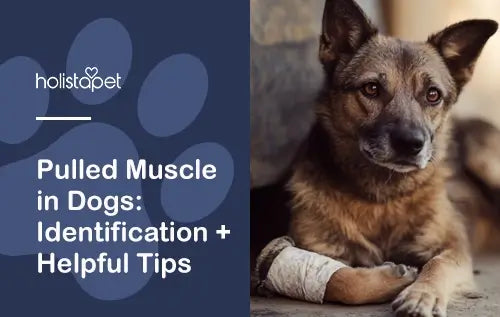Dogs pant often, or at least it seems that way. Panting in dogs is generally considered healthy, especially after a long walk, play sessions, or any physical activity. However, seeing your dog excessively panting is different. To find out if your dog is panting in a healthy or unhealthy manner, we've outlined some things you need to know below.
Why Do Dogs Pant?
A dog pants for the same reasons humans sweat – trying to lower the body's temperature. This is usually because the dog has been active and needs to cool down. However, there are a few other reasons for your dog's excessive panting. Since dogs can't tell us what's wrong, dog owners have to pay attention to a dog's body language and learn how to calm a panting dog. Let's go over some of the most common reasons a dog pants.
Dogs Need to Cool Down
According to the AKC, the normal temperature of a dog is between 99.5 and 102.5°F. When dogs pant, they are quickly releasing the hot air from their lungs and replacing it with cold external air. This speeds up any evaporation of water in their mouth, upper respiratory tract, and tongue. When the water evaporates it regulates a dog's body temperature and successfully cools them down.
Anxiety or Stress
If a dog is feeling anxious or fearful, stress hormones like adrenaline and cortisol may also raise the body temperature and trigger panting in the dog. A few other clues you may notice along with heavy panting due to anxiety are:
- Pacing
- Hiding
- Whining
- Shaking
- Licking of the lips
- Yawning repetitively
You will see this type of panting in dogs who are scared of loud noises like fireworks or thunderstorms. Dogs who are on dreaded car rides and visit the vet may also pant in this way. However, many of the same hormones involved in distress are also released during happy excitement. Panting or some of those other behaviors mentioned above may also be seen if your dog is anticipating a good snack or going on a walk. The key is to look at the rest of the dog's body language.
Brachycephalic Obstructive Airway Syndrome
Brachycephalic dog breeds are dogs with flat faces and short noses. Dog breeds such as French Bulldogs, Boxers, and Pugs are prone to pant more often due to Brachycephalic Obstructive Airway Syndrome. Their narrowed nostrils and upper respiratory tract causes these dogs to have difficulty breathing, so they tend to pant more often due to this difficulty in maintaining lower body temperature compared to other dogs.

Why is My Dog Panting So Much?
Dog pants are normal when they get excited, have a lot of energy, or are hot. However, rapid, prolonged, or loud panting outside of these situations is a bit different. It could indicate that your dog has a chronic underlying health issue, is dangerously overheated, or has experienced something traumatic and life-threatening. Some of the more common reasons dogs pant excessively include:
- Pain: Dogs are known to be good at hiding pain. At times, they do it so well that owners don't realize they're in pain until the problem worsens. If you notice your dog breathing fast because they are in pain, then they will most likely pant at strange times, like at night, while resting.
- Obesity: A dog that is overweight might struggle to breathe in fresh air and get oxygenated blood into their system. Obesity in dogs can lead to more serious issues like diabetes, heart failure, arthritis, and other diseases that can decrease their lifespan. If you believe your dog's panting might be due to a weight issue, you should get them checked out by a vet to discuss proper diet and exercise.
- Bloated Stomach: A distended stomach is very uncomfortable and is potentially life-threatening if associated with twisting of the stomach. Simple bloat can be intermittent and cause abnormal pressure to body parts including the lungs which will make a dog breathe heavier than normal. The pain can also trigger panting.
- Heatstroke: Heatstroke occurs when the dog's body temperature surpasses 106°F and the organs begin to fail. If your canine is overheated, you may notice a faster and heavier pant than usual, and he may appear to have trouble breathing. Signs your canine may have heatstroke include weakness or collapsing, vomiting, skin hot to the touch, and dark or bluish gums or tongue.
- Allergic Reaction: Signs of allergic reactions in dogs may include swelling, hives, or even anaphylactic shock. Keep in mind the most common signs of allergies, such as those triggers by food, airborne allergies, and more, usually affect the skin and gut of dogs. Sudden onset of panting, along with coughing, difficulty breathing, vomiting, pale or bright red gums, collapse, or bloody diarrhea are signs of anaphylactic shock and you should immediately seek veterinary care if you suspect this potentially fatal condition.
- Heart Problems: Heart problems might be the culprit of excessive or abnormal panting. Various issues with the heart may cause dogs to pant often since they struggle to catch their breath, even when they exert little energy. Dogs might also cough and show signs of weakness. You can also try Holistapet's CBD Oil for dogs to resolve heart problems.
- Cushing's Disease: Cushing's disease, or hyperadrenocorticism, is a condition in dogs that causes their body to produce an excess of the steroid hormone cortisol. This is more common in middle-aged and senior dogs. Signs of Cushing's disease include weight gain, thirst, thinning of hair and skin, a potbelly, and you guessed it, panting.
- Respiratory Problems: Respiratory disease will not necessarily cause panting, but trouble breathing can lead to stress and overheating, both of which often result in panting. Symptoms of respiratory problems in dogs include trouble breathing, fever, coughing, and lethargy.
Related article: Dog Bloated Stomach Home Remedies [Tips & Prevention Guide]
When to See a Vet if Your Dog is Panting too Much?
On average, dogs take around fifteen to thirty breaths a minute, depending on their age and size. You should get to know your dog's breathing patterns and normal panting to better notice anything out of the ordinary. If you believe your dog's panting is unusual and could mean something more critical, you should see the help of a veterinarian as soon as possible.

Final Thoughts
Some dogs are more hyper than others so they will often pant more often and heavily than a calm dog. However, normal panting should not be consistently excessive or at random times. Heavy breathing could be a sign that your dog is coping with something more serious, and at times fatal.
Proper care and attention can help prevent many of the reasons why dogs pant abnormally. While you're here why not take a moment to learn more about Holistapet? You can also take a look at our beneficial dog treats with CBD and other healthy ingredients.







![Probiotics For Dogs [Soft Chews] - HolistaPet](http://www.holistapet.com/cdn/shop/files/Probiotic-Infographic-1_472d7a29-e30c-435a-9638-1365d8c3a9f9.jpg?v=1725384841&width=104)


























Leave a comment
All comments are moderated before being published.
This site is protected by hCaptcha and the hCaptcha Privacy Policy and Terms of Service apply.